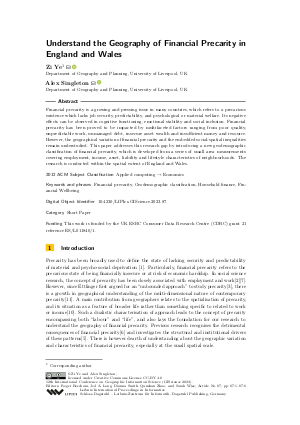Understand the Geography of Financial Precarity in England and Wales (Short Paper)
Authors
Zi Ye  ,
Alex Singleton
,
Alex Singleton 
-
Part of:
Volume:
12th International Conference on Geographic Information Science (GIScience 2023)
Part of: Series: Leibniz International Proceedings in Informatics (LIPIcs)
Part of: Conference: International Conference on Geographic Information Science (GIScience) - License:
 Creative Commons Attribution 4.0 International license
Creative Commons Attribution 4.0 International license
- Publication Date: 2023-09-07
File

PDF
LIPIcs.GIScience.2023.87.pdf
- Filesize: 1.12 MB
- 6 pages
Document Identifiers
Subject Classification
ACM Subject Classification
- Applied computing → Economics
Keywords
- Financial precarity
- Geodemographic classification
- Household finance
- Financial Wellbeing
Metrics
- Access Statistics
-
Total Accesses (updated on a weekly basis)
0PDF Downloads0Metadata Views
Abstract
Financial precarity is a growing and pressing issue in many countries, which refers to a precarious existence which lacks job security, predictability, and psychological or material welfare. Its negative effects can be observed in cognitive functioning, emotional stability and social inclusion. Financial precarity has been proved to be impacted by multifaceted factors ranging from poor quality, unpredictable work, unmanaged debt, insecure asset wealth and insufficient money and resource. However, the geographical variation of financial precarity and the embedded social-spatial inequalities remain understudied. This paper addresses this research gap by introducing a new geodemographic classification of financial precarity, which is developed from a series of small area measurements covering employment, income, asset, liability and lifestyle characteristics of neighbourhoods. The research is conducted within the spatial extent of England and Wales.
Cite As Get BibTex
Zi Ye and Alex Singleton. Understand the Geography of Financial Precarity in England and Wales (Short Paper). In 12th International Conference on Geographic Information Science (GIScience 2023). Leibniz International Proceedings in Informatics (LIPIcs), Volume 277, pp. 87:1-87:6, Schloss Dagstuhl – Leibniz-Zentrum für Informatik (2023)
https://doi.org/10.4230/LIPIcs.GIScience.2023.87
BibTex
@InProceedings{ye_et_al:LIPIcs.GIScience.2023.87,
author = {Ye, Zi and Singleton, Alex},
title = {{Understand the Geography of Financial Precarity in England and Wales}},
booktitle = {12th International Conference on Geographic Information Science (GIScience 2023)},
pages = {87:1--87:6},
series = {Leibniz International Proceedings in Informatics (LIPIcs)},
ISBN = {978-3-95977-288-4},
ISSN = {1868-8969},
year = {2023},
volume = {277},
editor = {Beecham, Roger and Long, Jed A. and Smith, Dianna and Zhao, Qunshan and Wise, Sarah},
publisher = {Schloss Dagstuhl -- Leibniz-Zentrum f{\"u}r Informatik},
address = {Dagstuhl, Germany},
URL = {https://drops.dagstuhl.de/entities/document/10.4230/LIPIcs.GIScience.2023.87},
URN = {urn:nbn:de:0030-drops-189828},
doi = {10.4230/LIPIcs.GIScience.2023.87},
annote = {Keywords: Financial precarity, Geodemographic classification, Household finance, Financial Wellbeing}
}
Author Details
Funding
This work is funded by the UK ESRC Consumer Data Research Centre (CDRC) grant 21 reference ES/L011840/1.
References
- Gabriella Alberti, Ioulia Bessa, Kate Hardy, Vera Trappmann, and Charles Umney. In, against and beyond precarity: Work in insecure times. Work, Employment and Society, 32(3):447-457, 2018. Publisher: SAGE Publications Ltd. URL: https://doi.org/10.1177/0950017018762088.
- Tom Barnes. Pathways to precarity: Work, financial insecurity and wage dependency among australia’s retrenched auto workers. Journal of Sociology, 57(2):443-463, 2021. URL: https://doi.org/10.1177/1440783320925151.
- Nancy Ettlinger. Precarity unbound. Alternatives: Global, Local, Political, 32(3):319-340, 2007. Publisher: SAGE Publications Inc. URL: https://doi.org/10.1177/030437540703200303.
- Richard Harris, Peter Sleight, and Richard Webber. Geodemographics, GIS and Neighbourhood Targeting. John Wiley & Sons, Ltd, 2005. Publication Title: Geodemographics, GIS and Neighbourhood Targeting ISSN: 1746-0166. URL: https://doi.org/10.1057/palgrave.dddmp.4350070.
- Mindaugas Leika and Daniela Marchettini. A generalized framework for the assessment of household financial vulnerability. IMF Working Paper No. 17/228, 2017. URL: https://papers.ssrn.com/abstract=3079554.
- Jirs Meuris and Carrie Leanaa. The price of financial precarity: Organizational costs of employees’ financial concerns. Organization Science, 29(3):398-417, 2018. URL: https://doi.org/10.1287/ORSC.2017.1187.
- Tajudeen Oluwafem Noibi, Digvijay Pandey, and Adrian Botello Mares. Understanding the concept of the precarity: mirroring colonia mexico 68. GeoJournal, 87:5251-5263, 2022. ISBN: 0123456789. URL: https://doi.org/10.1007/s10708-021-10562-8.
- Alex Singleton, Alexandros Alexiou, and Rahul Savani. Mapping the geodemographics of digital inequality in great britain: An integration of machine learning into small area estimation. Computers, Environment and Urban Systems, 82:101486, 2020. Publisher: Elsevier Ltd. URL: https://doi.org/10.1016/j.compenvurbsys.2020.101486.
- Alexander D Singleton and Seth E Spielman. The past , present , and future of geodemographic research in the united states and united kingdom in the united states and united kingdom. The Professional Geographer, 0124, 2014. URL: https://doi.org/10.1080/00330124.2013.848764.
- Kendra Strauss. Labour geography 1. Progress in Human Geography, 42(4):622-630, 2018. URL: https://doi.org/10.1177/0309132517717786.
- Louise Waite. A place and space for a critical geography of precarity? Geography Compass, 3(1):412-433, 2009. _eprint: https://onlinelibrary.wiley.com/doi/pdf/10.1111/j.1749-8198.2008.00184.x. URL: https://doi.org/10.1111/j.1749-8198.2008.00184.x.
- Lili Xiang, John Stillwell, Luke Burns, Alison Heppenstall, and Paul Norman. A geodemographic classification of sub-districts to identify education inequality in central beijing. Computers, Environment and Urban Systems, 2018. URL: https://doi.org/10.1016/j.compenvurbsys.2018.02.002.
